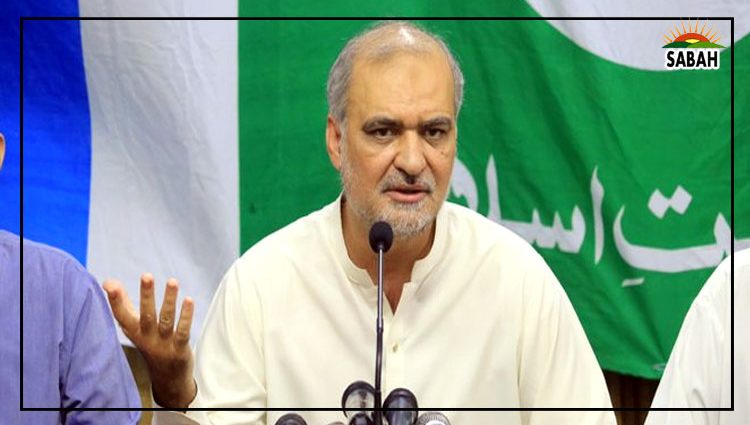Military operations can’t bring peace, lessons must be learned from the past: JI Chief
Hafiz Naeem says the govt should stop weaponizing legislation to seize mineral resources in tribal areas
PESHAWAR ( WEB NEWS )
Jamaat-e-Islami Emir Hafiz Naeemur Rehman has said that blind and indiscriminate military operations will not restore peace in Khyber Pakhtunkhwa, urging the decision-makers to draw lessons from past operations and rethink their approach to conflict resolution in the region.
Speaking at a Peace Jirga organized by Jamaat-e-Islami in response to the worsening law and order situation, ongoing curfews, and military operations in various districts, Rehman said, “The government should stop weaponizing legislation to seize mineral resources in tribal areas. Brave tribal communities must not be made scapegoats. The Constitution clearly states that local communities have the first right to resources discovered in their regions.” Current & former members of parliament, lawyers, religious scholars and tribal elders from across the province attended the proceedings.
The JI chief authorized Naib Emir Prof. Muhammad Ibrahim to consult with other political parties, tribal leaders, and stakeholders to devise a joint plan of peaceful protest — including sit-ins and a possible march to Islamabad — aimed at restoring peace in the province. He affirmed that Jamaat-e-Islami would lead any such movement from the front.
He criticized the legacy of General Pervez Musharraf, stating, “The dollar-driven policies initiated by Musharraf continue to haunt Pakistan to this day. Before launching a 22nd military operation, the leadership must assess what the past 21 have achieved in terms of lasting peace.”
Hafiz Naeemur Rehman further warned against divisive politics: “Pakistan is a federation of diverse nationalities — Pashtuns, Punjabis, Sindhis, and Baloch are not enemies. It is the ruling elite that pits them against each other for political gain. The same politicians who trade votes for power in Senate elections later cry helplessness when asked to deliver peace.”
Calling for inclusive dialogue, Rehman emphasized, “No one should pose himself as absolute authority in Pakistan. Solutions can only emerge through consultation and collective decision-making.”
The JI leader stressed that peace in Pakistan is linked to stable relations with Afghanistan. “Afghanistan is our brotherly neighbor. Diplomatic engagement is a welcome step, and a peaceful Afghanistan is in the interest of both countries.”
On Kashmir, he said, “It’s unfortunate that some actors show eagerness for onion-and-potato trade with India while lacking the same passion for Kashmir’s freedom. Unless the issue of Kashmir is resolved, no trade with India is acceptable. We reject any notion of third-party mediation as well.”
He reiterated Jamaat-e-Islami’s strong opposition to forced displacement and military operations that harm innocent civilians. “These operations martyr not just innocent children, women, and the elderly, but also soldiers who are sons of this soil.”
Rehman asserted that peaceful protest within constitutional boundaries is the democratic right of every citizen. “The Haq Do Balochistan Long March is a legitimate struggle for constitutional rights, and Jamaat-e-Islami stands firmly with it.”

